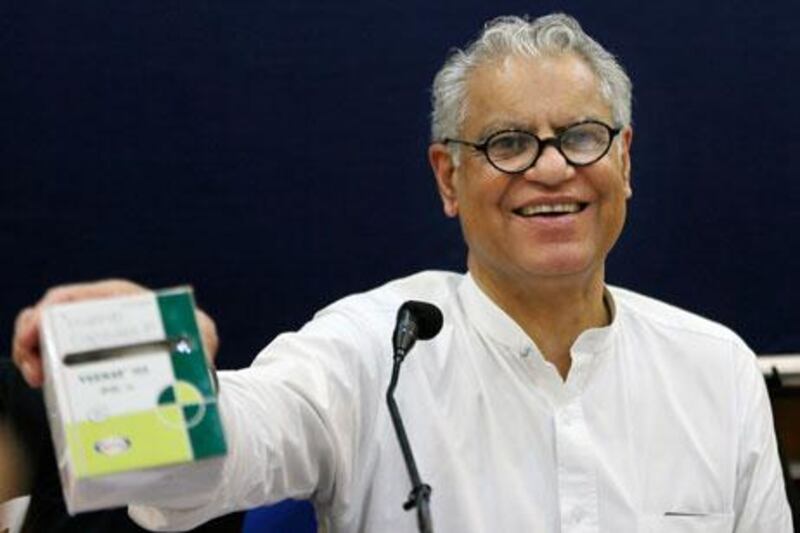NEW DELHI // India's Supreme Court today rejected an attempt by Novartis AG to patent an improved version of its anti-cancer drug Glivec in a decision hailed by patient advocates.
The judgement ended the company's seven-year legal battle and was likely to dent the sales of pharmaceutical multinationals in India, but it will also make "generic" versions of Glivec, manufactured by Indian drug companies, more widely available and affordable.
Novartis had lost two appeals in lower courts since 2006.
The decision, handed down by a two-judge bench, maintained that the new Glivec used a version of an existing molecule and that this could not be granted patent protection.
"A repetitive patent is not permissible on the same drug," the judges said, even though the new Glivec has been granted a patent in 40 other countries.
Novartis had argued the new version of the drug was more easily absorbed into the body an deserved a new patent.
The judgement is in line with India's traditionally strict pharmaceutical patenting regime, which is mindful of making drugs affordable to the country's poor millions.
"This is a big day for us," Kiran Hukku, the director of the Delhi branch of the non-profit Cancer Patients Aid Association (CPAA) told The National. "Last year, we were able to supply only 5,000-odd doses of Glivec to people we were helping. This year, with more generics, I'm sure we'll do much better."
At present, a month's dosage of Glivec can cost 120,000 rupees (Dh8,100) or more - the sort of pricing that made Novartis' Glivec a best-selling drug in 2012, with sales worth around Dh17.25 billion. A generic version of Glivec could cost as much as 90 per cent less, according to some estimates.
Today's ruling was not the first time India's courts and patent offices have enabled cheaper versions of ground-breaking drugs to come onto the market. Last year, Natco Pharma, which manufactures a generic version of Glivec, was allowed to see a copy of Bayer AG's Nexavar, another anti-cancer drug.
Also last year, Pfizer, Roche and Merck lost patents to various drugs in their stables, on the grounds that they were not sufficiently innovative.
Thus Novartis seemed to have expected the court's decision to go against it. Last week, Paul Herrling, head of tropical disease research at Novartis, told reporters: "Looking at recent cases, the mood in India makes it more likely that we would have a more negative response."
The Glivec case is just a part of the wider debate over pharmaceuticals, which pits public interest against intellectual property rights.
Medecins Sans Frontieres, the international medical charity, said last year that a Novartis victory would ensure that "more and more treatments will remain priced out of reach for the duration of the patent term - 20 years or more - including those that are merely new forms of existing medicine and didn't deserve a patent in the first place."
Saikrishna Rajagopal, a New Delhi-based intellectual property lawyer, said yesterday that India's patent-unfriendly regime ran the risk of driving away major multinationals and, in the long run, constricting the availability of drugs in the country.
"There's a great deal of concern in the industry that we're granting a premium to what is essentially copying," he said.
Mr Rajagopal said that, in a country like the United States, a drug company could win swift relief and financial damages if its patent was infringed. In India, he said, cases dragged on for years, during which local companies made their money by selling generics.
At the end of the litigation, Novartis received no financial damages. "There's no culture of awarding damages here. There's no treasure chest at the end of the rainbow," Mr Rajagopal said.
As a result, he said, small drug manufacturers, instead of investing in original research and development, are content to make just generics, which can often be of poor quality.
But Ms Hukku, of the CPAA, said that her organisation had been happy with the quality of cancer generics. "The government's quality control process is quite good."
Aditya Dev Sood, the founder and chief executive of the New Delhi-based Centre for Knowledge Societies, which consults on innovation, said it was a myth that patent-based protections were the "only way to incentivise innovation".
"The health of the public is both a public and a private good, which may merit special protections and exceptions," Mr Sood said. "Moreover, it is an area where our ethical obligations to one another as fellow humans may have to trump existing legal standards including intellectual property protections."
ssubramanian@thenational.ae





